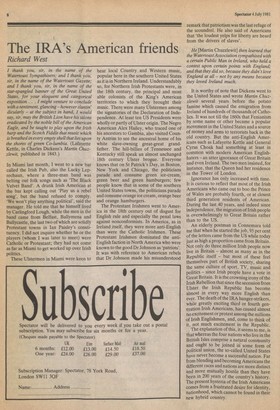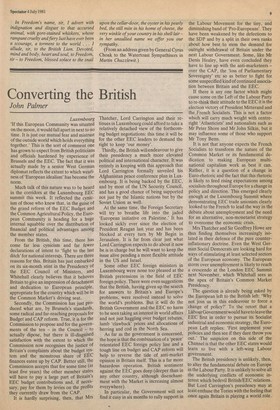The IRA's American friends
Richard West
I thank you, sir, in the name of the Watertoast Sympathisers; and I thank you, sir, in the name of the Watertoast Gazette; and I thank you, sir, in the name of the star-spangled banner of the Great United States, for your eloquent and categorical exposition. . . I might venture to conclude with a sentiment, glancing — however slantin' dicularly — at the subject in hand, I would say, sir, may the British Lion have his talons eradicated by the noble bill of the American Eagle, and be taught to play upon the Irish harp and the Scotch Fiddle that music which is breathed in every empty shell that lies upon the shores of green Co-lumbia. (Lafayette Kettle, in Charles Dickens's Martin Chuzzlewit, published in 1843.) In Miami last month, I went to a new bar called the Irish Pub, also the Lucky Leprechaun, where a three-man band was belting out folk songs such as 'The Black Velvet Band'. A drunk Irish American at the bar kept calling out 'Play us a rebel song', but the band refused to comply. 'We won't play anything political', said the manager. He told me that he himself lived by Carlingford Lough, while the men in the band came from Belfast, Ballymena and Ballycastle, the last two of which are solidly Protestant towns in Ian Paisley's constituency. I did not inquire whether he or the players (whom I was later to meet) were Catholic or Protestant; they had not come as far as Miami to get worked up over Irish politics.
These Ulstermen in Miami were keen to hear local Country and Western music, popular here in the southern United States as it is in Northern Ireland. Understandably so, for Northern Irish Protestants were, in the 18th century, the principal and most able colonists of the King's American territories to which they brought their music. There were many Ulstermen among the signatories of the Declaration of Independence. At least ten US Presidents were wholly or partly of Ulster origin. The Negro American Alex Hailey, who traced one of his ancestors to Gambia, also visited County Antrim to see the ancestral home of his white slave-owning great-great grandfather. The hill-billies of Tennessee and Kentucky still speak an almost unchanged 18th century Ulster brogue. Everyone knows that on St Patrick's Day, in Boston, New York and Chicago, the politicians parade and consume green ice-cream, green beer and green hamburgers; few people know that in some of the southern United States towns, the politicians parade and consume orange ice cream, orange beer and orange hamburgers.
The Protestant Irishmen went to America in the 18th century out of disgust for English rule and especially the penal laws against nonconformists. In America, as in Ireland itself, they were more anti-English than were the Catholic Irishmen. These Protestant Irishmen dominated the antiEnglish faction in North America who were known to the good Dr Johnson as 'patriots'. It was with reference to American rebels that Dr Johnson made his misunderstood the scoundrel. He also said of Americans that 'the loudest yelps for liberty are heard from the drivers of slaves'.
He [Martin Chuzzlewit] then learned that the Watertoast Association sympathised with a certain Public Man in Ireland, who held a contest upon certain points with England; and that they did so, because they didn't love England at all — not by any means because they loved Ireland much.
It is worthy of note that Dickens went to the United States and wrote Martin Chuzzlewit several years before the potato famine which caused the emigration from Ireland of hundreds of thousands of Catholics. It was not till the 1860s that Fenianism by some name or other became a popular movement in the United States and a source of money and arms to terrorists back in the old country. But the anti-English Americans such as Lafayette Kettle and General Cyrus Choak had something at least in common with modern American Englishhaters — an utter ignorance of Great Britain and even Ireland. The two men insisted, for instance, that the Queen had her residence in the Tower of London.
Ignorance has only increased with time. It is curious to reflect that most of the Irish Americans who came out to boo the Prince of Wales are probably fourth, or at closest third generation residents of American. During the last 40 years, and indeed since independence, the migration of Irish people is overwhelmingly to Great Britain rather than to the US.
An elderly postman in Connemara told me that when he started the job, 95 per cent of the letters came from the US while today just as high a proportion came from Britain. Not only do three million Irish people now live in Britain — almost as many as in the Republic itself — but most of these feel themselves part of British society, sharing the same culture of sport, TV, music and politics — since Irish people have a vote in Great Britain. It is the crowning irony of the Irish Rebellion that since the secession from Ulster the Irish Republic has become almost in every way more English than ever. The death of the IRA hunger-strikers, while greatly exciting third or fourth generation Irish Americans, has caused almost no excitement or protest among the millions of Irish Englishmen, and, come to think of it, not much excitement in the Republic. The explanation of this, it seems to me, is that whereas the four nations who live in the British Isles comprise a natural community and ought to be joined in some form of political union, the so-called United States have never become a successful nation. Far from blending and becoming Americans the different races and nations are more distinct and more mutually hostile than they have been in 200 years of the country's history. The present hysteria of the Irish Americans comes from a frustrated desire for identity, nationhood, which cannot be found in their new hybrid country. In Freedom's name, sir, I advert with indignation and disgust to that accursed animal, with gore-stained whiskers, whose rampant cruelty and fiery lust have ever been a scourage, a torment to the world . . . I allude, sir, to the British Lion. Devoted, mind and body, heart and soul, to Freedom, sir — to Freedom, blessed solace to the snail upon the cellar-door, the oyster in his pearly bed, the still mite in his home of cheese, the very winkle of your country in his shell lair — in her unsullied name we offer you our sympathy.
(From an address given by General Cyrus Choak to the Watertoast Sympathisers in Martin Chuzzlewit.)







































 Previous page
Previous page